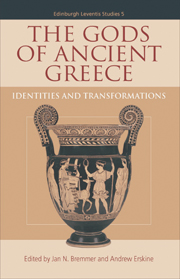Book contents
- Frontmatter
- Contents
- Preface
- List of Illustrations
- Notes on Contributors
- List of Abbreviations
- Introduction: The Greek Gods in the Twentieth Century
- 1 What is a Greek God?
- PART I SYSTEMATIC ASPECTS
- PART II INDIVIDUAL DIVINITIES AND HEROES
- PART III DIACHRONIC ASPECTS
- 14 Early Greek Theology: God as Nature and Natural Gods
- 15 Gods in Early Greek Historiography
- 16 Gods in Apulia
- 17 Lucian's Gods: Lucian's Understanding of the Divine
- 18 The Gods in the Greek Novel
- 19 Reading Pausanias: Cults of the Gods and Representation of the Divine
- 20 Kronos and the Titans as Powerful Ancestors: A Case Study of the Greek Gods in Later Magical Spells
- 21 Homo fictor deorum est: Envisioning the Divine in Late Antique Divinatory Spells
- 22 The Gods in Later Orphism
- 23 Christian Apologists and Greek Gods
- 24 The Materiality of God's Image: Olympian Zeus and Ancient Christology
- PART IV HISTORIOGRAPHY
- Epilogue
- Index
16 - Gods in Apulia
from PART III - DIACHRONIC ASPECTS
Published online by Cambridge University Press: 05 August 2013
- Frontmatter
- Contents
- Preface
- List of Illustrations
- Notes on Contributors
- List of Abbreviations
- Introduction: The Greek Gods in the Twentieth Century
- 1 What is a Greek God?
- PART I SYSTEMATIC ASPECTS
- PART II INDIVIDUAL DIVINITIES AND HEROES
- PART III DIACHRONIC ASPECTS
- 14 Early Greek Theology: God as Nature and Natural Gods
- 15 Gods in Early Greek Historiography
- 16 Gods in Apulia
- 17 Lucian's Gods: Lucian's Understanding of the Divine
- 18 The Gods in the Greek Novel
- 19 Reading Pausanias: Cults of the Gods and Representation of the Divine
- 20 Kronos and the Titans as Powerful Ancestors: A Case Study of the Greek Gods in Later Magical Spells
- 21 Homo fictor deorum est: Envisioning the Divine in Late Antique Divinatory Spells
- 22 The Gods in Later Orphism
- 23 Christian Apologists and Greek Gods
- 24 The Materiality of God's Image: Olympian Zeus and Ancient Christology
- PART IV HISTORIOGRAPHY
- Epilogue
- Index
Summary
If we are going to talk in anything but generalities about gods, we need to provide a clear focus on both the time and place under discussion. The more precise we can be about both, the more substance our comments can have. While the gods may be absolute, human perceptions of them are not. What follows here is a discussion of evidence for local perceptions of gods from the southeastern region of Italy usually called Apulia. The focus will be on the fourth century BC, particularly the first half of it, which was a creative period of transition for which we have a great deal of evidence.
Let me define the region more precisely, both geographically and culturally (Fig. 16.1). Apulia is the term used for the region of south Italy that stretches from the tip of the heel, up the east coast as far as the Gargano, and inland to the Bradano river. Taranto was the one Greek city in all of Apulia; the rest of that vast area was inhabited by Italic people who had been there for centuries before the arrival of the Greeks. By the eighth century BC three archeologically distinct local cultures can be recognized – the Messapians to the south, the Daunians to the north, and the Peucetians between them. It is likely that Messapian was the language of all three groups – as opposed to Oscan, which was the language of the Samnites to the north and the Lucanians to the west.
- Type
- Chapter
- Information
- The Gods of Ancient GreeceIdentities and Transformations, pp. 335 - 347Publisher: Edinburgh University PressPrint publication year: 2010

